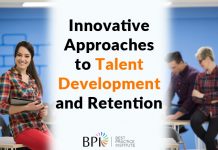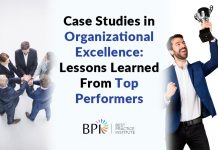Best Practice Institute will honor four Novelis senior leaders for the pivotal roles they have played in the remarkable turnaround of the aluminum products manufacturer and recycler.
The 2014 BPI C-Suite Award will be presented to Steve Fisher, senior vice president and chief financial officer of Novelis, and Nick Madden, senior vice president and chief supply chain officer.
The 2014 BPI Engineering Bench Strength Award will be presented to Joanne McInnerney, vice president of global talent management, and Marilen Endicott, senior manager of global talent management and organizational effectiveness.
Novelis is the world’s largest producer and recycler of aluminum rolled products, with fiscal 2014 revenue of $10 billion. The company has 11,400 employees in nine countries.
Novelis’s Wild Ride
Novelis has been on a wild ride, even by the standards of modern business, during its short history since being cast off by former parent company, Alcan, in 2005. To many, the company’s problems seemed insurmountable.
The new Novelis had regional operations scattered across four continents with little structure for global oversight. It was locked in to contracts to produce aluminum products at prices below the cost of raw materials. It had huge debt and little liquidity.
The company was on the verge of bankruptcy when it was purchased in 2007 by India-based Hindalco. Hindalco’s own stakeholders were so dubious of the purchase that Hindalco stock tumbled 13 percent the next day.
Phil Martens became Novelis CEO in 2009. Martens is widely credited for leading the turnaround. However, when Martens arrived, things at Novelis were rapidly going from bad to worse. The 2008 financial crisis had decimated the demand for durable goods. Novelis, which had had record revenue of $11.2 billion in 2008 (its highest annual revenue to date) saw revenue fall by 22% during the next two years to $8.7 billion in 2010.
Martens and Novelis responded to the many challenges they faced with aggressive cost-cutting, optimization of the company’s global footprint, and a daring commitment to strategic expansion. The bold measures have included:
• A 10 percent workforce reduction from 12,700 in 11 countries in 2008 to 11,400 employees in nine countries today.
• Closure or divestiture of plants in Canada, Europe and the U.S. that were underperforming or producing non-core products.
• Ambitious expansion of plants in Brazil, South Korea and the U.S.
• Building Novelis’s first plant in China, which will produce aluminum sheet metal for the automotive industry. The plant is on target to be commissioned by the end of the year.
• Building a recycling center in South Korea in 2012 that is the largest such center in Asia, and building a state-of-the-art recycling center in Germany which is expected to be commissioned this year.
Novelis’s revenue for fiscal 2014 is about $10 billion. After a staggering $1.9 billion net loss in 2009, the company has turned a profit for five consecutive years. In Novelis’s 2014 annual report, Martens declared that most of the company’s transformation is now complete.
Novelis has gone from a struggling spin-off sliding towards bankruptcy to a questionable acquisition being pummeled by financial crisis and economic downturn to an industry leader that is profitable and growing. Novelis is the archetype of a corporate turnaround.
The BPI Awards
Fisher, Madden, McInnerney and Endicott, four Novelis executives who have played key roles in the turnaround, will be presented the BPI Awards during Best Practice Institute’s upcoming Senior Executive Board meeting.
BPI is a leadership development center serving many of the world’s top corporations, including a majority of the Fortune 500. BPI’s Senior Executive Board is an ultra-exclusive network and think tank of the talent executives of some of the world’s largest companies.
Leslie Joyce, Novelis’s chief people officer and a member of BPI’s Senior Executive Board, nominated the four Novelis leaders for recognition. The final nominees were selected by the entire Senior Executive Board and the winners were chosen by BPI Founder and CEO Lou Carter.
BPI’s annual awards honor executives, practitioners and innovators who have made a significant contribution to leadership and management of their organizations. BPI has a big focus on talent management and looks for a commitment to talent and leadership development in selecting its award recipients.
“The Novelis story truly is an exciting one,” said Carter. “Novelis has proven what we already knew, but which we too often forget: Major challenges in the marketplace also create major opportunities.”
Carter said it is important to give simultaneous recognition to all four executives to underscore that great successes rarely result from one individual, but from several great leaders who share a common goal and strategy.
Steve Fisher: Future-Focused Finance
Steve Fisher joined Novelis in 2006, was a leader in negotiations with Hindalco, and became CFO in May 2007, the month of the Hindalco acquisition. Next to Martens, perhaps no one has been given more credit for Novelis’s emerging success story than Fisher.
After the acquisition, Fisher negotiated a $4.8 billion capital refinancing plan that gave the company some breathing room and created the liquidity Novelis needed to pursue its expansion goals. Fisher also vigorously pursued cost-cutting and efficiencies.
When the Atlanta Business Chronicle named Fisher CFO of the Year in 2012, Martens said, “Steve’s forward thinking has been a vital part of Novelis’ growth … He has played an essential role in the turnaround of this company, helping us to transform it into a truly world-class corporation and the leader in our industry in a few short years.”
Martens challenged Fisher to cultivate a new culture in corporate finance. The work of finance is to do more than assemble data, keep a lid on costs and run a compliance shop, said Fisher. Finance should be a valued partner to other business units, providing substantive analysis and getting out in front of decisions. Finance can limit itself to merely recording historical data, but at Novelis, under Fisher’s leadership, finance is about making the future happen.
Fisher said his most important discovery since becoming CFO is the importance of talent. There was a time when talent management occupied perhaps 5 percent of Fisher’s schedule, but he now devotes 50 percent to 60 percent of his time to knowing his team members, identifying gaps in talent and doing succession planning.
Fisher described talent management as “day in and day out, the most important and the most rewarding thing I do.”
Nick Madden: Changing the Procurement Model
Nick Madden had been with the former parent company, Alcan, since 1978. He was named Novelis’s global chief procurement officer in 2006, becoming one of a handful of senior leaders working together to cobble a global management structure for the new company. Of 14 executive officers listed on the Novelis website, Madden is one of just three who was with Novelis at the time of the 2005 spin-off and the 2007 Hindalco acquisition. In 2012 he became chief supply chain officer.
When Novelis set out to streamline, optimize and integrate its manufacturing operations worldwide, Madden believed one thing had to change about how Novelis did procurement. Functional reporting is essential to successful global procurement, Madden said.
Because Novelis began as a collection of far-flung regional plants with little global integration, it is not surprising that local procurement officers were accustomed to reporting to line managers and plant managers and not to Madden’s global procurement team. However, the only way to align regional procurement efforts with global strategy is to require procurement managers to report directly to the global procurement function, Madden said.
According to one recent study of about 250 manufacturing companies, half of procurement officers report to the global procurement function. The other half continue to report to their business unit, with only half of them doing even dotted-line reporting to global procurement.
Madden wants a direct line to his procurement officers so he can keep them focused not just on transactional procurement (what we need today at the local level), but on strategic procurement — the right materials from the right suppliers, delivered at the right times and in the right ways to support the global business strategy. Madden’s goal, he said, is to wield the supply chain as a strategic weapon.
Madden said the Novelis executive team spends more time on talent management than on any other discipline. He said he tries to personally greet each new hire himself.
“We take the whole talent process seriously,” Madden said. “We know our people. We spend a lot of time walking the floor. We try to live it.”
McInnerney and Endicott: Creating an Engineer Pipeline
Joanne McInnerney was recruited as vice president of global talent management in 2010 by Chief People Officer Leslie Joyce, who had just joined Novelis the year before.
Joyce and McInnerney faced some extraordinary talent challenges. Novelis had never done a global talent review. Novelis had no online presence to list jobs or recruit candidates. Novelis had no leadership development programs. That’s a lot of gaps to fill. Joyce, McInnerney and their team have implemented all these things during the past five years.
Five leadership development programs have been launched at Novelis:
• Leadership Essentials 1 and Leadership Essentials 2: Week-long programs which teach Novelis’s seven essential leadership qualities. The programs are open to all employees and designed to train new and middle managers.
• Leadership Launch, Accelerated Leadership and Global Leadership: Two-, three- and four-week programs, respectively, for high-potential leaders. The programs include work-based assignments, special projects, classroom instruction, 360-degree assessments and mentoring.
Joyce and McInnerney also identified the need for a special program to raise up the next generation of engineers. The company’s drive to expand has created a greater need than ever for more engineers at Novelis.
Marilen Endicott oversees the Engineering Development Program (EDP) for which she and McInnerney are being honored by Best Practice Institute. Endicott joined McInnerney’s team in 2012 as senior manager of global talent management and organizational effectiveness.
Endicott said the EDP was conceived after reviewing the results of Novelis’s first-ever global talent review. Novelis has many older engineers who have been with the company and its former parent for decades, but far fewer young engineers who are acquiring the same experience and expertise.
Novelis needs more engineers to staff its new and expanding plants. It also needs more engineers focused on research and development. In 2012, Novelis opened a $30 million, 160,000-square foot Global Research and Technology Center in Kennesaw, GA, less than an hour northwest of Novelis headquarters in Atlanta.
The EDP is designed to accelerate the careers of recently graduated engineers. The young engineers are given a work assignment at a plant. They also attend periodic week-long classes held all over the world, giving participants global exposure and the chance to network with other young Novelis engineers.
The EDP gives participants experience in every area of the aluminum rolling process during the two-year program. About 40 engineers comprised the first EDP graduating class in 2013. More than 200 young engineers are now in Novelis’s EDP pipeline all over the world.
~ ~ ~ ~ ~
LOUIS CARTER, founder and CEO of Best Practice Institute, has led BPI to become one of the world’s top associations for leadership and human resource development, with more than 42,000 subscribers. Carter is creator of Skillrater.com, the cloud-based anytime feedback tool on a social collaboration platform, and the BPI Online Learning Portal at www.bestpracticeinstitute.org. Carter has written eleven books on best practices and organizational leadership, including the Best Practice series and the Change Champion’s Field Guide.
BEST PRACTICE INSTITUTE is a leadership and management association focusing on best and innovative business practices. BPI has more than 42,000 subscribers, from managers to senior and C-level executives. It has corporate and individual members in about two dozen countries on five continents, including executives and employees of more than half of the Fortune 500.










